Can Bichon Frise Be Brown?
Can Bichon Frise Be Brown?
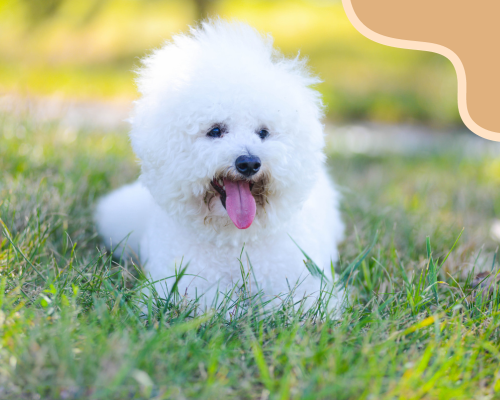
Vet Reviewed
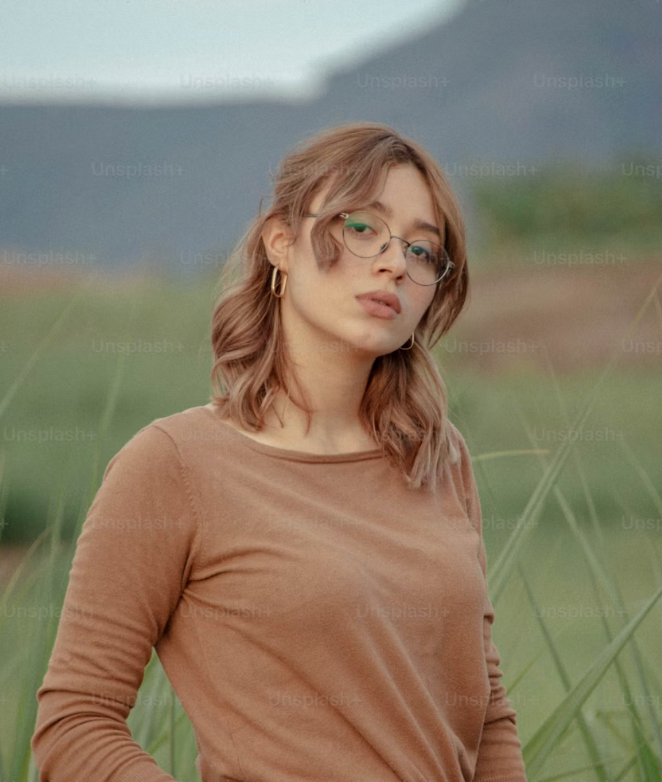
By: Sarah Hodgson
November 5, 2023
- Posted in Dogs
Table of Contents
Known for their small stature, curly coat, and playful nature, Bichon Frise dogs are iconic. They come in many colors cream, white and more. However, can a purebred Bichon Frise be brown? In this post, we will explore just that.
Let's dive in!
Understanding Bichon Frise Coat Color
When you think of a Bichon Frise, the first image that probably comes to mind is a small, white, fluffy dog. That's the typical coat color of the breed. The Bichon Frise's coat is a "powder puff" appearance, which is due to the breed's double coat. The outer coat is coarse and curly, while the undercoat is soft and dense, creating an overall fluffy look.
However, while white is the most common color, the Bichon Frise can also have shades of cream, apricot, or gray on their coat. These colors are usually present at birth and may darken or fade as the dog grows older.
Can a Purebred Bichon Frise be Brown?
Now, to answer the question at hand, can a purebred Bichon Frise be brown?
No, a purebred Bichon Frise cannot be brown. The breed standard allows for white and shades of cream, apricot, and gray, but brown is not a recognized color for the Bichon Frise breed. If you see a brown Bichon Frise it's most likely mix bred.
This does not mean that you will never see a brown Bichon Frise. It is possible for a Bichon Frise to have a brown coat, but this would indicate that the dog is not a purebred, but rather, a mixed breed. Mixed breed Bichon Frises can have a variety of coat colors, including brown, due to the influence of the other breed's genes.
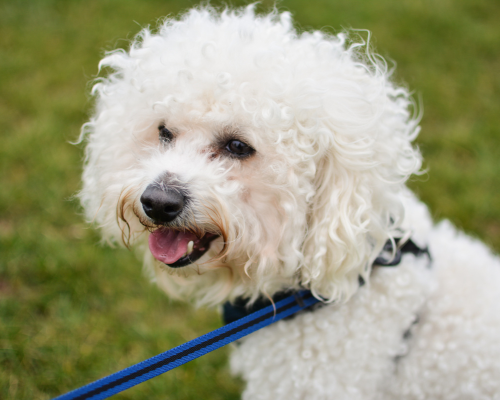
Bichon Frise Breed Standards by Kennel Clubs
To understand why a brown Bichon Frise is not recognized as a purebred, we need to look at the breed standards set by kennel clubs. The American Kennel Club (AKC), for example, clearly states in their breed standard for the Bichon Frise that the coat must be white. Cream, apricot, or gray shades are allowed, but only in certain areas, and these colors should not predominate.
The same goes for other major kennel clubs such as the United Kennel Club (UKC) and the Fédération Cynologique Internationale (FCI). The breed standards may differ slightly from one kennel club to another, but they all agree on one thing, a purebred Bichon Frise should be predominantly white.
6 Bichon Frise Mixed Breeds That Can Be Brown
While a purebred Bichon Frise cannot be brown, mixed breeds can certainly have a brown coat. These are typically a result of breeding a Bichon Frise with another breed that carries the gene for brown coat color. Here are six Bichon Frise mixed breeds that can have a brown coat:
1. Bichon Poodle Mix (Bichpoo)
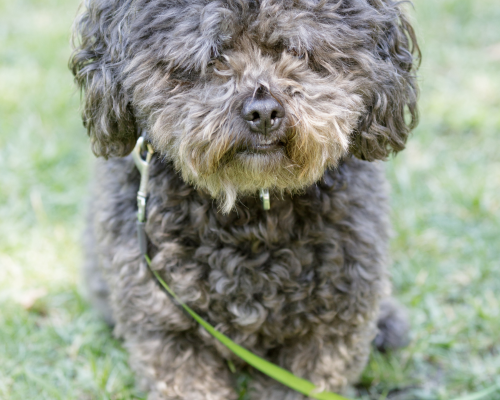
The Bichon Poodle Mix (Bichpoo) is a small to medium-sized dog with a curly, non-shedding coat and a friendly, playful temperament. However, they are not a recognized dog breed. Bichpoos are known for their friendly, playful, and affectionate nature. They are social dogs that enjoy being with their human family and are often good with children and other pets and they come with a brown coat.
2. Bichon Shih Tzu Mix (Zuchon)
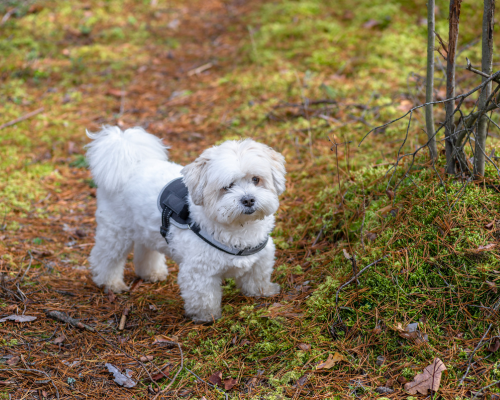
The Zuchon, a charming and affectionate crossbreed, combines the playful and friendly traits of the Bichon Frise with the regal and dignified nature of the Shih Tzu. They are typically small in size, with a sturdy build and a fluffy, non-shedding coat. Zuchons often have expressive, dark eyes, and their coats can vary in color, including white, cream, apricot, or a combination of these.
Their friendly disposition and social nature make them wonderful companions for families and individuals alike.
3. ,Bichon Cocker Spaniel Mix (Cockachon)

The Cockachon is a delightful blend of the Bichon Frise and the Cocker Spaniel. These dogs are known for their cheerful and affectionate personalities. They are typically small to medium-sized, with a well-proportioned body and a soft, wavy coat that can come in a variety of colors, such as white, cream, black, or brown. Their expressive eyes and droopy ears give them an endearing appearance. Cockachons are intelligent and easy to train, making them loyal and loving companions for those seeking a sociable and family-friendly pet.
4. Bichon Havanese Mix (Havachon)
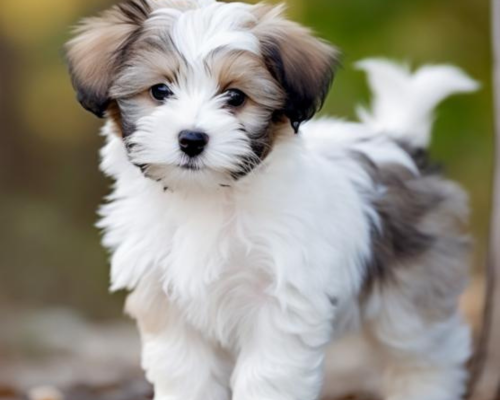
The Havachon combines the Bichon Frise and the Havanese, resulting in a charming and adaptable small breed. These dogs have a compact build and a luxurious, silky coat that is often white, cream, or a mix of both. With expressive eyes and a friendly demeanor, Havachons are known for their affable and easygoing nature. They are well-suited for families and individuals who appreciate a loving and adaptable companion that is equally comfortable in a bustling household or a quiet home.
5. Bichon Maltese Mix (Maltichon)

The Maltichon is a delightful blend of the Bichon Frise and the Maltese, resulting in an enchanting and affectionate small dog. They typically have a compact and elegant frame with a long, silky coat that is predominantly white but can also have shades of cream. Maltichons are known for their expressive, dark eyes and their friendly and gentle temperament. They thrive on companionship and are excellent choices for individuals or families looking for a devoted and loving canine friend.
6. Bichon Beagle Mix (Beagle Frise)

The Beagle Frise is a unique crossbreed that combines the Bichon Frise with the Beagle, resulting in a small to medium-sized dog with a friendly and outgoing personality. They often have a sturdy build with a short to medium-length coat that can vary in color, including white, cream, and various Beagle-like patterns. Beagle Frises have expressive eyes and floppy ears, along with a curious and lively nature. They make great companions for those who enjoy a mix of playfulness and affection in a dog.
Recognizing a Purebred Bichon Frise
Recognizing a purebred Bichon Frise goes beyond just coat color. While a purebred Bichon Frise should have a white coat, other factors such as body shape, size, temperament, and health also play a crucial role in determining the purity of the breed. Additionally, a pedigree or DNA test can provide definitive proof of a dog's breed.
If you are purchasing a Bichon Frise from a breeder, ensure that they are reputable and can provide proof of the dog's lineage. A responsible breeder will prioritize the health and temperament of their dogs over their coat color.
The Bottom Line
So there you have it, while a purebred Bichon Frise cannot have a brown coat, mixed-breed Bichons surely can.
They come in a variety of colors, including brown. If you are seeking a brown Bichon Frise, consider adopting a mixed breed. However, remember that a dog's coat color is just one aspect of their overall appearance and personality. Regardless of their coat color, Bichon Frises are known for their friendly and sociable nature, making them wonderful dogs.
Frequently Asked Questions
Can a Bichon Frise change color as they age?
Yes, a Bichon Frise's coat can change color as they age. Puppies are often born with cream, apricot, or gray patches that may darken or fade as they grow older. However, a predominantly brown coat is not typical for a Bichon Frise.
Why is my Bichon Frise's coat turning brown?
If your Bichon Frise's white coat is turning brown, it could be due to staining from food, dirt, or tear and saliva. Regular grooming can help keep your Bichon Frise's coat clean and white.

Subscribe to Petfluence!
Get updates on the latest posts and more from Petfluence straight to your inbox.